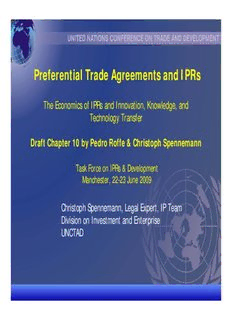
Preferential Trade Agreements and IPRs - Policy Dialogue PDF
Preview Preferential Trade Agreements and IPRs - Policy Dialogue
Preferential Trade Agreements and IPRs The Economics of IPRs and Innovation, Knowledge, and Technology Transfer Draft Chapter 10 by Pedro Roffe & Christoph Spennemann Task Force on IPRs & Development Manchester, 22-23 June 2009 Christoph Spennemann, Legal Expert, IP Team Division on Investment and Enterprise UNCTAD UNCTAD/CD-TFT 1 Objectives of chapter • To show extent & breadth of changes brought by PTAs: shift in balance between rights holders and users • To show how PTAs contribute to expansion of international IPR architecture • Focus: PTAs signed by DCs with US, EU and EFTA UNCTAD/CD-TFT 2 From TRIPS to PTAs (1) • Since 1995: more than 250 PTAs among WTO Members • Focus on PTAs with full IP chapters (US; recent EU; EFTA) • Trend: upward harmonization & strengthening of exclusive rights, shift in balance; loss of TRIPS flexibilities UNCTAD/CD-TFT 3 From TRIPS to PTAs (2) • PTAs legitimate consequence of TRIPS Art 1 • DCs are often demandeurs • Market access to OECD • But hesitant on IP (ex. Chile) • OECD countries push for stronger IP • Response to domestic industry UNCTAD/CD-TFT 4 Overview of EU PTAs • Traditionally: no particular model, no detailed provisions • Commitment to multilateral IP treaties • Substantive obligations mainly on Gis • Major shift: EPA with CARIFORUM • Detailed provisions on enforcement • Optional disclosure of origin requirement • Data exclusivity (DE) in proposals to Andean countries UNCTAD/CD-TFT 5 Overview of EFTA PTAs • Comparable to former EU PTAs • No uniform model • Main thrust on adherence to multilateral IP conventions • Important exception: protection of pharmaceutical & agrochemical test data • Exclusivity • Compensation • Broad reference to TRIPS Art 39 UNCTAD/CD-TFT 6 Overview of US PTAs • Very detailed & expansive coverage of IPRs • Prior to TRIPS (NAFTA), but mainly with US – Jordan (2001) → uniform model • 2002 Trade Promotion Authority (TPA) • Standard of protection similar to that in US law • Important shift 2007: expiry of TPA • Bipartisan understanding reflecting public health concerns • Outstanding PTAs with Colombia, Panama, Peru UNCTAD/CD-TFT 7 US PTAs: « certification » • PTA implementation bills by Congress: PTA enters into force upon satisfaction by US President regarding other Party’s domestic implementation (« certification ») • After PTA negotiation, second negotiation on domestic law • Impact on DCs’ freedom under Art 1 TRIPS • By contrast, PTAs do not affect US domestic law (unless express authorization by Congress) UNCTAD/CD-TFT 8 Specific areas: public health • Multilateral debate shifted to regional & bilateral level after Doha Declaration & TRIPS draft Article 31bis • Concerns remain: • Access to medicines (high prices) • Building of domestic capacities • No reverse engineering (India, OECD history) • Foreign generic investment (example Uganda) UNCTAD/CD-TFT 9 Example 1: patentability criteria • US PTAs introduce notion of « utility » • Potentially broader than EPO’s « industrial application » • Business models • Research tools → safeguards in US law • Patents on new uses of known products • Process patents in US law → unclear in PTA • Promotion of domestic producers? UNCTAD/CD-TFT 10
Description: